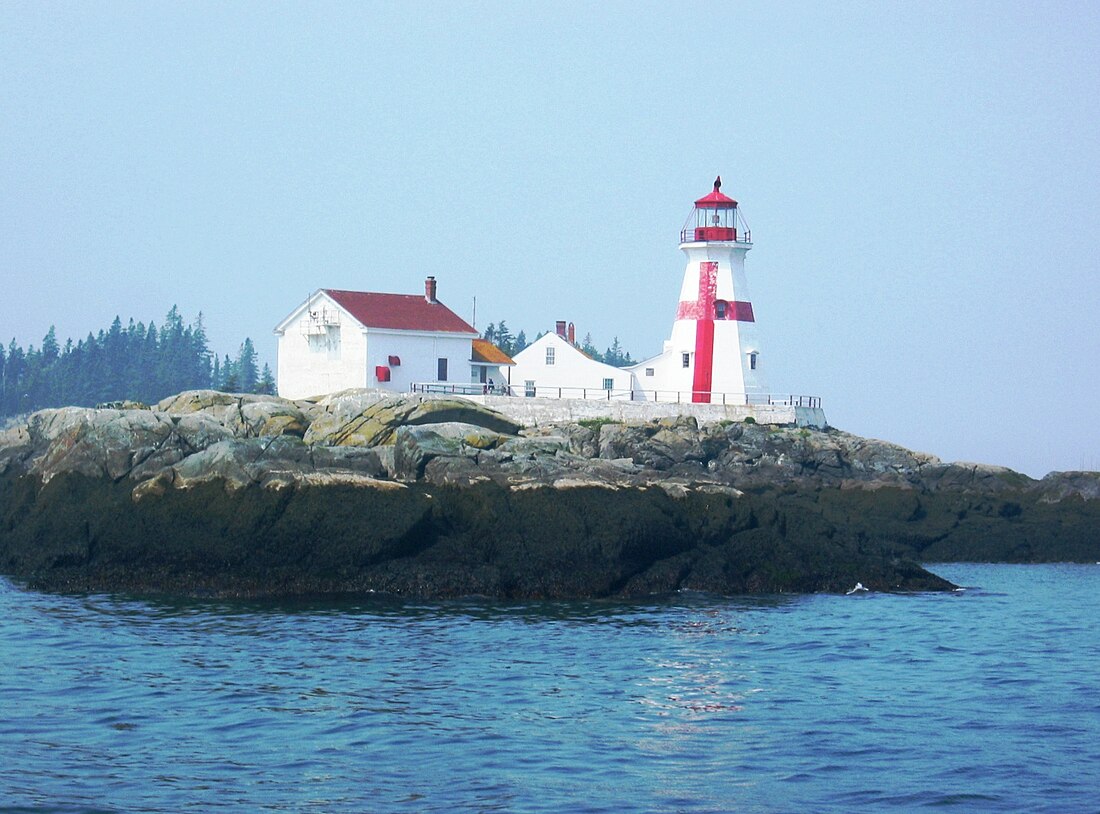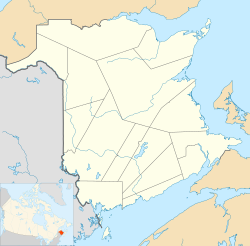Top Qs
Timeline
Chat
Perspective
Campobello Island
Island in Campobello, New Brunswick, Canada From Wikipedia, the free encyclopedia
Remove ads
Campobello Island (/ˌkæmpəˈbɛloʊ/,[2][3] also US: /-poʊˈ-/)[4] is the largest and only inhabited island in Campobello Parish in southwestern New Brunswick, Canada,[5] near the border with Maine, United States.[6] It is the site of the Roosevelt Campobello International Park, Head Harbour Lighthouse, and of Herring Cove Provincial Park.
It has been an incorporated rural community since 2010 and is a member of the Southwest New Brunswick Service Commission (SNBSC).[7] Despite the name, the rural community also includes all other islands in the parish.
The island is part of Charlotte County, which was formed in 1784 when New Brunswick was partitioned from Nova Scotia.[8]
In 1770, the island was granted to Capt. William Owen, who named it in honour of Lord William Campbell,[9] who was governor of Nova Scotia, and noting "Campo Bello" meant "Beautiful Field" in Italian.[10]
Remove ads
History
Summarize
Perspective

The island was originally settled by the Passamaquoddy Nation, who called it Ebaghuit.[citation needed]
The first Europeans were from the French expedition of Pierre Dugua de Mons and Samuel de Champlain, who founded the nearby Saint Croix Island settlement in 1604.[11] France named the island Port aux Coquilles ("Seashell Harbour"). It has been speculated that the fort of Jean Serreau di St Aubin, known to have been built somewhere in the Passamaquoddy Bay but vacated in the years surrounding King William's War and Benjamin Church's 1704 expulsion of the French from the Bay, may have been situated on Campobello Island.[12]
Following the War of the Spanish Succession, under terms of the Treaty of Utrecht (1713), the island became part of the British colony of Nova Scotia. Its first post office opened in 1795.[13]
In 1770, the island was granted to Captain Owen who immediately set to work building a town he dubbed New Warrington (Wilson's Beach, today) but after only a year on the island in June 1771, Owen was recalled to active military service; he never returned to Campobello Island although still advertising for industrious farmers to help settle it before his 1778 death in India.
The population was increased by United Empire Loyalists after the American Revolutionary War. Smuggling was a major part of the island's prosperity around this time, starting as soon as 1807.[14] In later years, it was remarked that merchant ships secretly putting ashore at Eastport, Maine would report in ledgers that they travelled to "Sweden" once or twice a day with their wares.[14] The first major smuggling trial in the Bay of Fundy convicted Gillam Butler, of Campobello Island in 1796 of illegally importing US whale oil under the pretense it was harvested in New Brunswick.[15]
During the War of 1812 the Royal Navy seized coastal lands of Maine as far south as the Penobscot River but returned them following the war, except for offshore islands. Capt. Owen wrote to the Prince Regent, noting that if the Crown insisted on ordering Campobello residents to perform military drills on the mainland as he had cautioned against, the Crown may find Campobello fighting against it, and stating "the Crown alone, without our consent, has no right to tax us.[13]
In 1817, the United States relinquished its claim to Campobello, Deer, and Grand Manan islands, in exchange for islands in Cobscook Bay. The provincial government of New Brunswick funded the construction of Head Harbour Lighthouse, or East Quoddy Head Light, in 1829; this light station would be a counterpart to West Quoddy Head Light which the United States built in the previous decades. As of 1842, Thomas Wyer was one of three commissioners of the lighthouses on Machias Seal Island, Campobello and at Saint Andrews.[16]

In 1835, the illegitimate son of Captain Owen, Vice-Admiral William Fitzwilliam Owen, became sole proprietor of the island and took great interest in his advanced years in building the island community but struggled with an "addiction" to local women.[17]
In 1866, a band of more than 700 members of the Fenian Brotherhood arrived at the Maine shore opposite the island with the intention of seizing Campobello[18] but were dispersed by British warships from Halifax.[19]
British naval officer John James Robinson became owner of the island in 1857 by virtue of having married Owen's daughter.[20] In 1881, it was sold to a group of American businessmen, including James Roosevelt. In the 1880s, the island was developed as a resort summer colony for wealthy Canadians and Americans, as was nearby St. Andrews, New Brunswick and Bar Harbor, Maine. A luxurious resort hotel and many grand estates were built.[21] From 1883, the Roosevelt family famously made Campobello Island their summer home.[22]
By the mid-1800s, Campobello Island had a population in excess of 1,000, which grew to 1,230 by 1910.
Remove ads
Geography
The island is at the entrance to Passamaquoddy Bay, adjacent to the entrance to Cobscook Bay, and within the Bay of Fundy. The island is one of the Fundy Islands. The island has no road connection to the rest of Canada; it is connected by the Franklin Delano Roosevelt Bridge to nearby Lubec, Maine. Reaching mainland Canada by car without crossing an international border is possible only during the summer season and requires two separate ferry trips, first to nearby Deer Island, then to L'Etete.[23]
The ferry to Deer Island was stopped in 2017 after the boat sank, leaving the island without a direct connection to the rest of Canada.[24] Service was restored and became year-round due to the COVID pandemic.[25]
The jurisdiction of the eponymous rural community and of the census division include Head Harbour Island.
Measuring 14 kilometres (8.7 mi) long and about five kilometres (3.1 mi) wide, it has an area of 39.6 square kilometres (15.3 sq mi). On the north is a high bluff headland, East Quoddy Point.[26] On the west are Charley Point and the Mulholland Point navigation light.[26]
Remove ads
Economy

The island has several good harbours,[27] and the majority of residents are employed in the fishing, aquaculture or tourism industries.
The two major tourist attractions on the island are Herring Cove Provincial Park and Roosevelt Campobello International Park. The latter was created in 1964 and was officially opened by U.S. President Lyndon Johnson and Canadian Prime Minister Lester Pearson in 1966.
Infrastructure
Summarize
Perspective

The island's only highway, Route 774, is connected by the Franklin Delano Roosevelt Bridge to Lubec, Maine – the easternmost town in the continental United States. The only transportation link with the rest of Canada is a seasonal ferry service to Deer Island.[28]
United States Customs and Border Protection service began searching packages to the island, originating in Canada, in 2019, prompting outcry.[29][30][31]
In late 2020, residents renewed their demands for the Canadian government to build a bridge to the New Brunswick mainland given the current ferry cannot operate in winter (three other New Brunswick islands do benefit from year-round ferry services). Driving to mainland Canada requires travel into Maine via the bridge, which proved difficult during the restrictions imposed on both sides of the border during the COVID-19 pandemic in North America. The border closure meant driving to and from the island was prohibited, except for essential purposes.[32]
The government agreed to pay for an extension of the ferry service until 10 January 2021; however, winter weather after this was too dangerous. Member of Parliament John Williamson said "I think we’re in a position that some infrastructure dollars could be made available once the province has a plan and proposal ready to submit".[33][31]
The island has one school, Campobello Island Consolidated School, for all school grades, in the Anglophone South School District.
Remove ads
Communities
Communities within the rural community:[34][35][36]
- North Road
- Otter Cove
- Welshpool
- Wilsons Beach
Bodies of water
Bodies of water[a] at least partly within the rural community:[34][35][36]
- Friars Bay
- Lake Glensevern
- Harbour de Lute
- Head Harbour
- Head Harbour Passage
- Lubec Channel
- Lubec Narrows
- Mill Cove Creek
- Mill Stream
- Quoddy Narrows
- Passamaquoddy Bay
Other islands
Other named islands within the rural community:[34][35][36]
- Duck Islands
- Duck Rock
- Head Harbour Island
- Little Island
- Sugar Loaf Rock
Conservation areas
Conservation areas at least partly within the rural community:[34][35][36]
Demographics
In the 2021 Census of Population conducted by Statistics Canada, Campobello Island had a population of 949 living in 423 of its 612 total private dwellings, a change of 8.8% from its 2016 population of 872. With a land area of 39.59 km2 (15.29 sq mi), it had a population density of 24.0/km2 (62.1/sq mi) in 2021.[38]
Language
See also
Notes
References
External links
Wikiwand - on
Seamless Wikipedia browsing. On steroids.
Remove ads



